This is our regular round up of stories of progress from around the world. If you'd like to join the 48,000 people who get this in their inbox every week, you can subscribe for free below.
The Progress Report
The energy transition is stalling. Projects are being scrapped, share prices are tanking, car companies are reconsidering their plans, emissions are skyrocketing, the sky is falling and wind turbines are terrible for whales and ehrmagad humans are the worst have you seen those electric vehicle graveyards and what's the point of meat-free Mondays when China is building hundreds of coal plants and, oh... hold on. Wait, what?
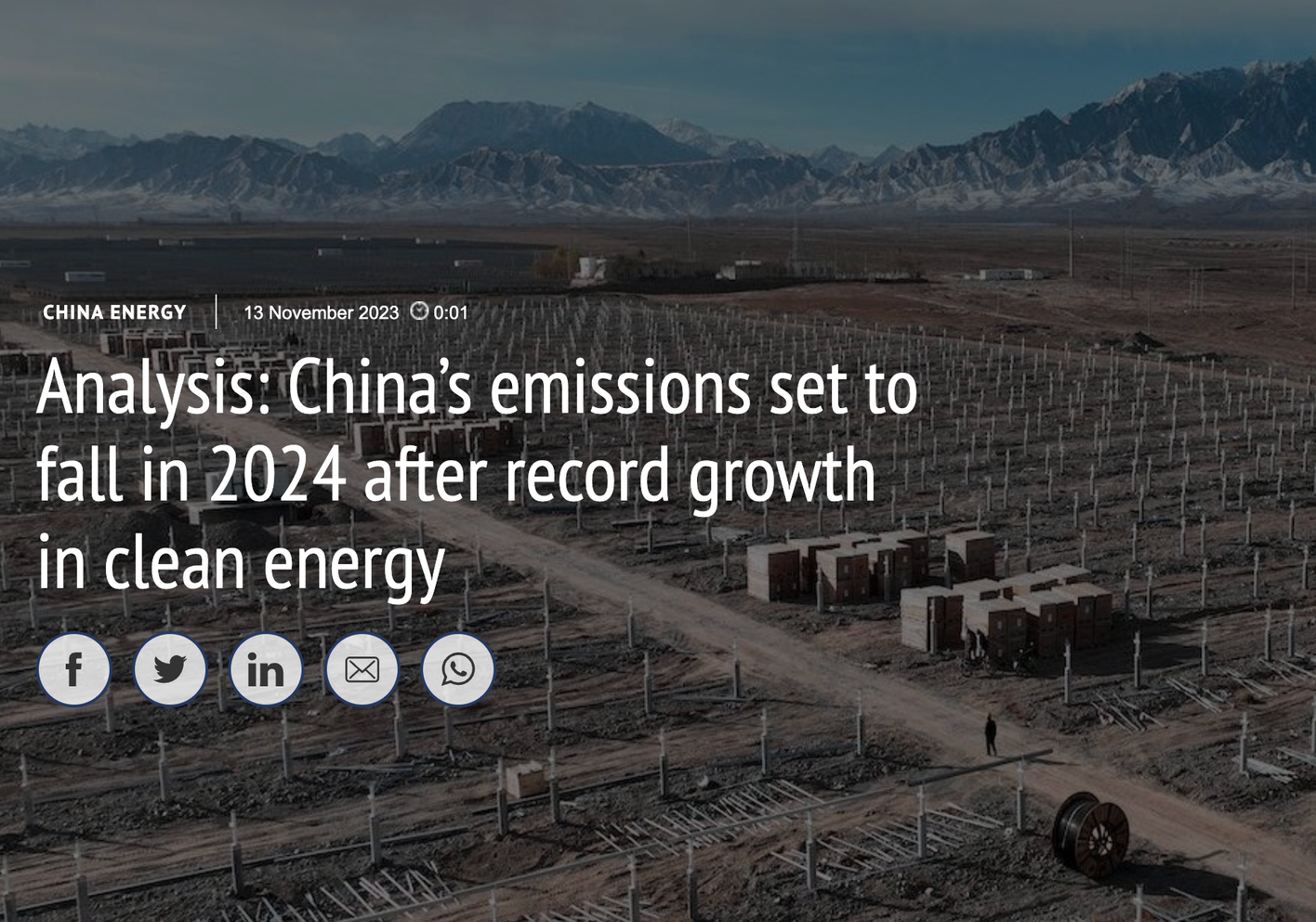
There have been record additions of low-carbon capacity, setting up a surge in electricity generation next year. Combined with a rebound in hydro following a series of droughts, these record additions are all but guaranteed to push fossil-fuel electricity generation and CO2 emissions in China into decline in 2024. Carbon Brief
Good luck finding it in the news.
After setbacks caused by the pandemic, there has been significant worldwide recovery in the scale-up of diagnosis and treatment for tuberculosis. Last year, 7.5 million people were reached—the highest figure ever recorded—and the number of deaths fell t0 1.3 million, down from 1.4 million in 2021. Global efforts to combat TB have now saved over 75 million lives since 2000. WHO
For millennia, our ancestors suffered and died with tuberculosis, without knowing what it was, what caused it, or how to stop it. Today, we have knowledge and tools they could only have dreamed of. We have political commitment, and we have an opportunity that no generation in the history of humanity has had: the opportunity to write the final chapter in the story of TB.
Dr Tedros Adhanom Ghebreyesus, WHO Director-General
Since 2017, 226 million people in Africa have been protected from yellow fever via a single-dose vaccine that provides lifelong protection. 'We are making good progress after the disruption of the pandemic, but there is still work to be done to ensure that governments continue to prioritize yellow fever. It is possible to eliminate these epidemics in our lifetime.' WHO
The dominant story of global economics in the 21st century has been that improvements in standards of living have unfairly accrued to only a small elite, leaving much of the world’s population no better—or even worse—off in deteriorating circumstances. This is not true. The data unambiguously show that our world is not only better off but also becoming far more equal. Cato
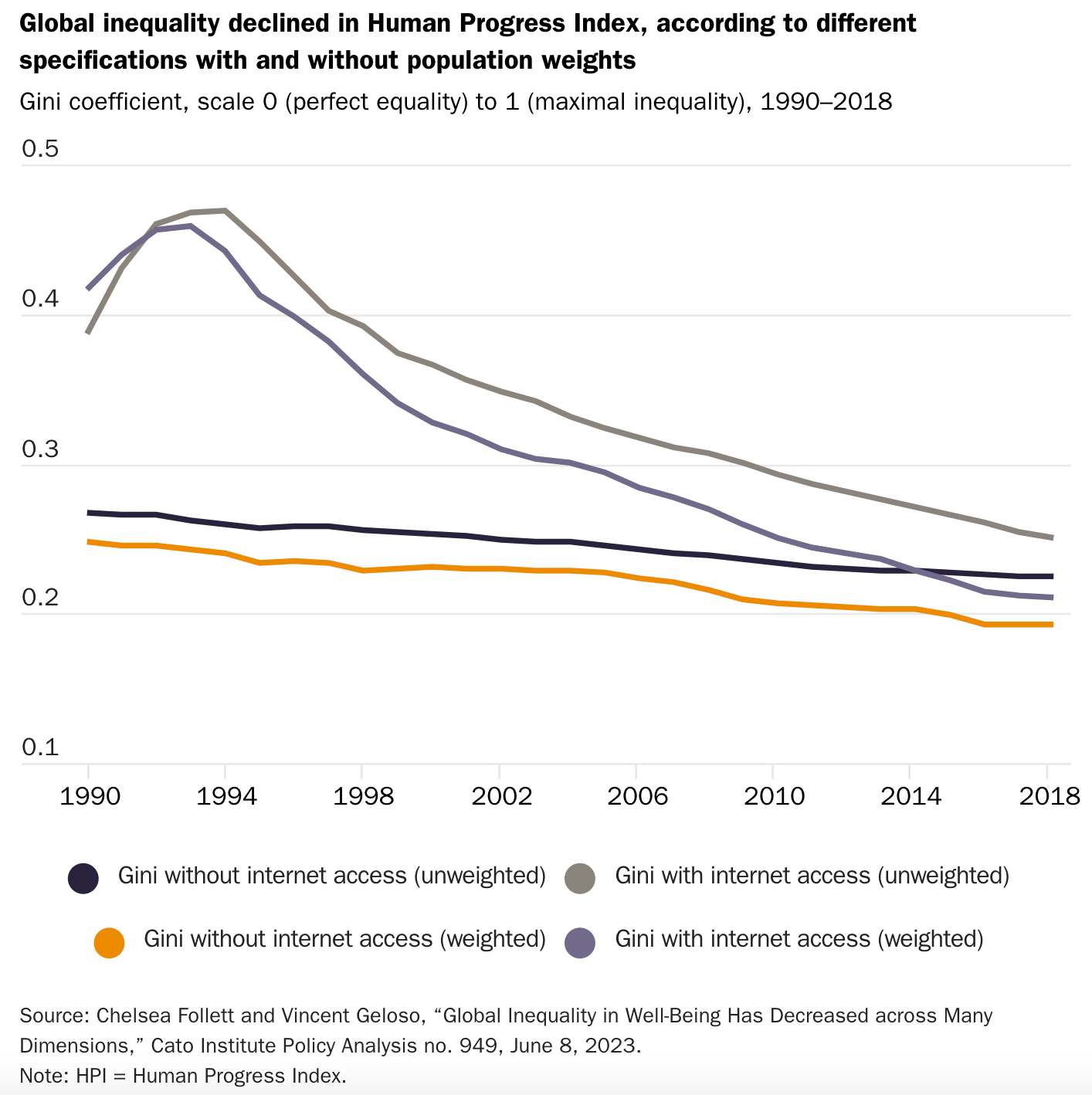
The Canadian Cancer Society just released a report showing that lung cancer death rates have decreased by 3.8% per year since 2015. This represents the largest annual decline in mortality rates across all cancer types, and the fastest decline in lung cancer mortality ever recorded. 'We are making considerable headway to reduce lung cancer deaths in Canada.'
The Latvian parliament has voted to allow same-sex couples to establish civil unions in a historic first for the Baltic nation. Officials voted on Thursday, 9th November to permit same-sex couples the right to have their partnership legally recognised, as part of legislation set to come into effect in mid-2024. Pink News
School feeding programs are some of the biggest social safety nets in the world. The EU just allocated funding to feed 2 million primary school students in Afghanistan; 287,000 children in London are now benefitting from free school meals; the Philippines has set aside $280 million for national school feeding programs; and Niger is rolling out free meals to all boarding school students.
Meet the team behind Nairobi’s vast school meals kitchen. As the four million residents of Kenya's capital city sleep, 'the largest green kitchen in Africa' comes to life in a building on the edge of the city’s industrial district, preparing 60,000 meals for children every day as part of the largest school meals program in Africa. Guardian
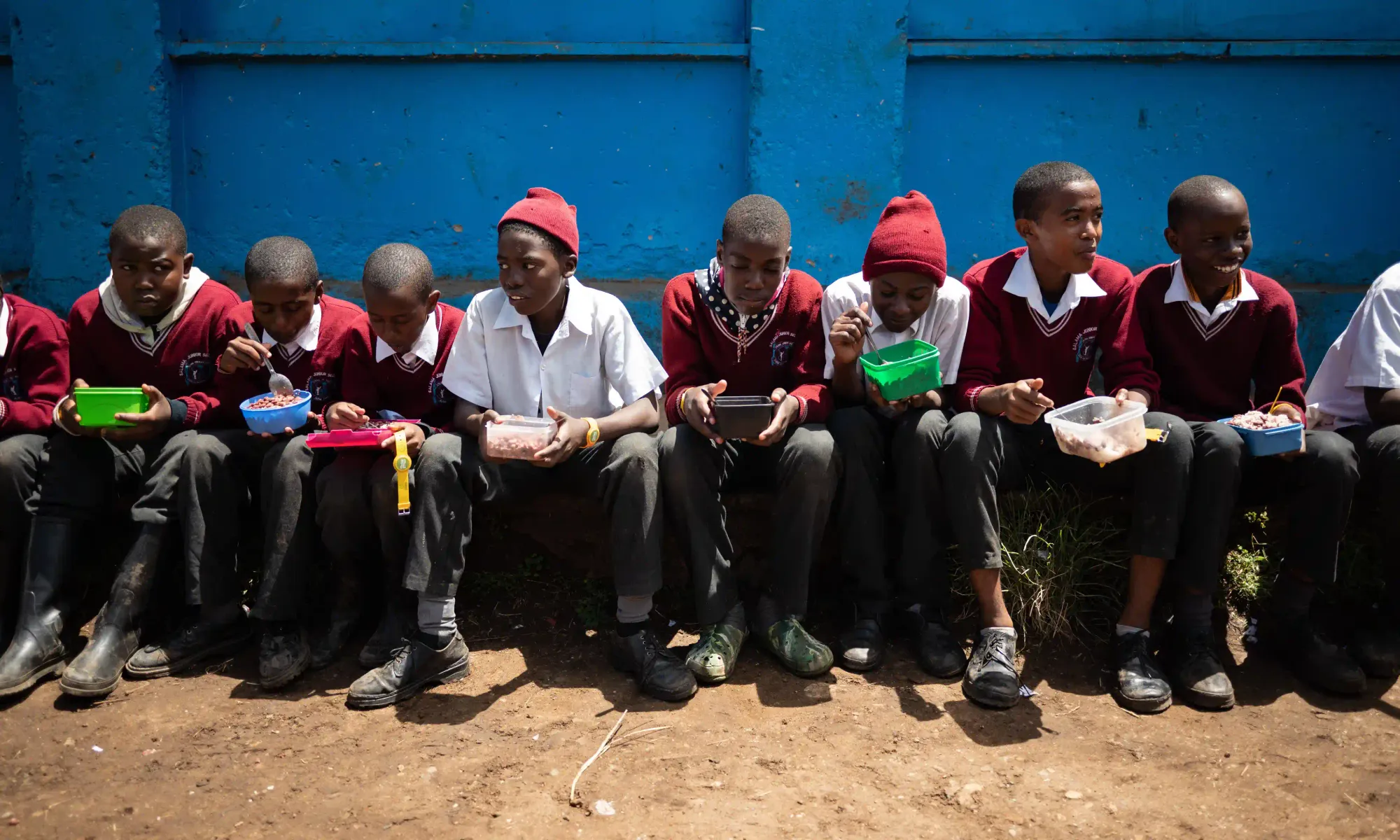
In the past fifteen months, voters in the United States have protected reproductive rights on ballot questions six times in a row, in Kansas, Montana, Vermont, California, Michigan, and Kentucky. Now they've permanently enshrined the right to abortion in Ohio and protected it in Virginia. The best way to think about what happened last week? Another big win for women.
Last year, economists predicted with 100% certainty that the US was going to enter a recession within a year. It did not happen. As it turns out, the big economic story of 2023 is not recession, it’s the disconnect between Americans' feelings and their behaviour. Bad vibes, good data. Everyone says they're pissed off, yet inflation-adjusted consumer spending is way above pre-pandemic trends. 🎁: Bloomberg
Pregnant women across the Democratic Republic of the Congo will be offered free healthcare. Women in 13 out of 26 regions will, by the end of the year, be entitled to free services during pregnancy and for one month after childbirth, and babies will receive free healthcare for their first 28 days under the scheme. Guardian
India's sanitation workers have won a major victory after the country's Supreme Court ruled that the practice of manual scavenging—referring to the removal of human waste from dry latrines and sewers with bare hands—should be completely eradicated. The ruling affects millions of people, 95% of whom are from an 'untouchable' caste, and 98% are women. Waging Non Violence
Approximately 60 million Ethiopians still lack access to safe drinking water, and over 112 million are without basic sanitation facilities. However, progress is happening. In the past decade over 10 million people have gained access to improved water and sanitation, and three major new projects are underway, representing a collective investment of approximately $1 billion. World Bank
A deep dive on Shakti, the free bus ride program for women in Karnataka, India. More than one billion rides have been used so far, women now make up more than half the riders on Karnataka's buses since the scheme began in June, and the state also asked for 5,600 more buses to be added to its fleet to meet the growing demand. 🎁: Bloomberg
More progress you didn't hear about
China-US relations continue to improve, with progress on trade, military, and drug control. Don't believe it? Here's the view from China. A water conservation project has rejuvenated and beautified 163 abandoned wells in Tamil Nadu, India. Crime in the Philippines has plummeted this year. The number of kids in foster care in America is lower than it's been in decades. The lessons of Ohio's abortion rights victory. In 2019, Thailand introduced the rotavirus vaccine, and the following year infant deaths from diarrhoea fell by 20%. Women in the United States are gaining ground in the highest-paid occupations. High school completion rates have increased markedly for both on- and off-reserve First Nations people in Canada. The Asian country of Laos has made incredible recent progress on poverty reduction, maternal care, and education. The United States is more flood-resilient today than at any other point in living memory. In Paris, the number of people using bike paths has doubled in the last year, and during rush hour, bicycles now outnumber cars on some of the capital's main roads.
If it bleeds, it leads
Here's a collection of headlines about shoplifting in the United States from the last six months, taken from The New York Times, CNN, The Wall Street Journal, the New York Post, Vox, the Associated Press, The Guardian, Fox News, The Hill, and Forbes.

Here are the data from the Council on Criminal Justice on shoplifting incidents in 24 major US cities over the last five years, showing a decline from a pre-pandemic trend of 45 per 100,000 residents to an average of around 36 per 100,000 this year.
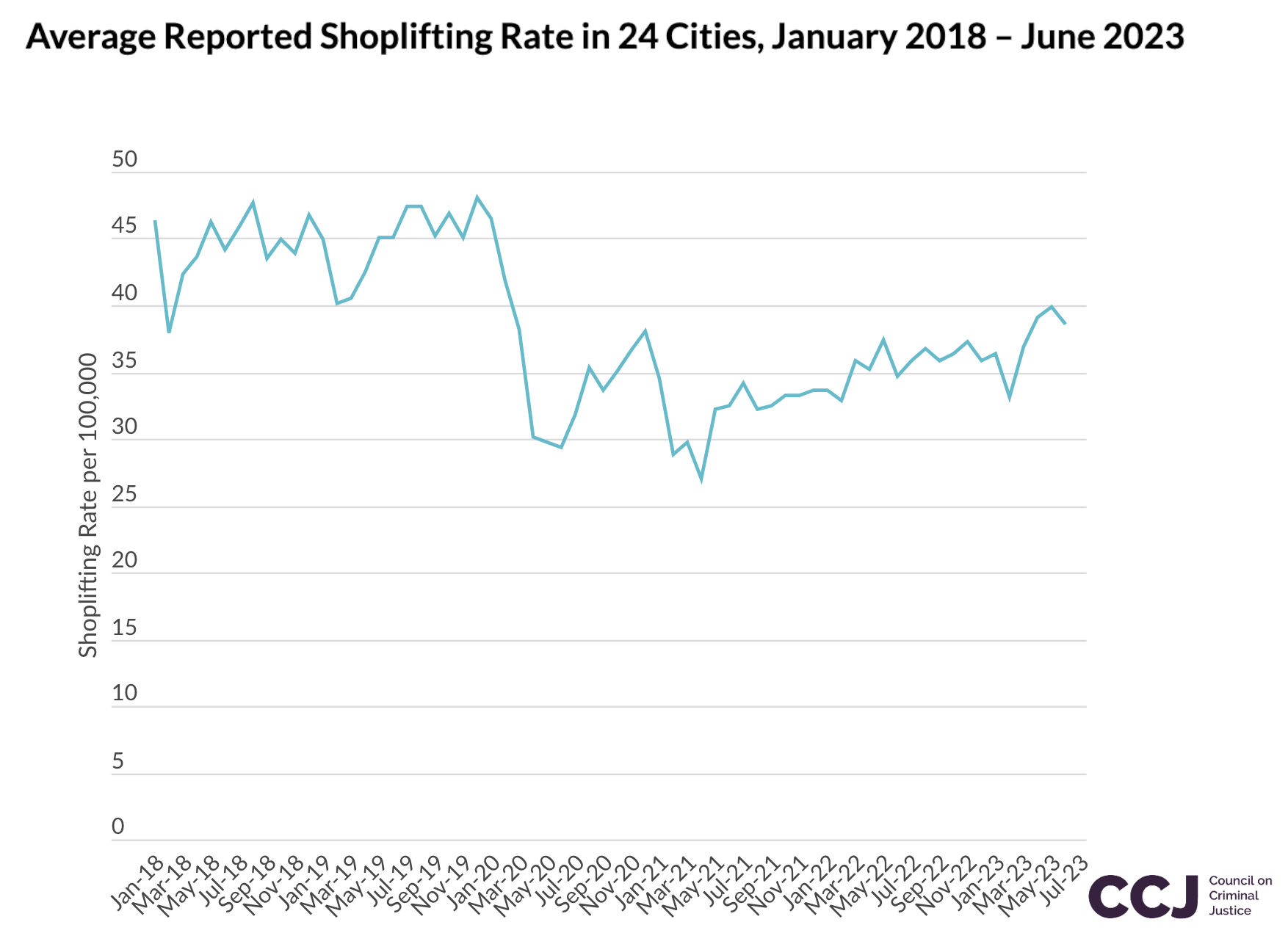
Which begs the question: does America have a shoplifting problem?
Or does it have a journalism problem?
The Great Turning
The EU has passed a landmark biodiversity law with targets to restore at least 30% of degraded habitats by 2030, 60% by 2040, and 90% by 2050. The legislation aligns with the COP15 biodiversity agreement and will address Europe’s land and water habitats, 80% of which are in a poor condition. France24
Deforestation in the Columbian Amazon is down 70% year-on-year, thanks to new environmental policies and initiatives like the Communitarian Multiactive Cooperative of the Common. Run by former fighters in the Revolutionary Armed Forces of Colombia (FARC), the group has already planted 125,000 trees, with another 250,000 trees ready in their cooperative nursery.
In recent years, Tibet has established 47 nature reserves and numerous wildlife breeding and rescue centres. As a result, endangered wildlife such as Yunnan golden hair monkeys and Tibetan red deer have shown remarkable recoveries, and the population of Tibetan antelope has increased from 70,000 to over 300,000 since the last century. CGTN
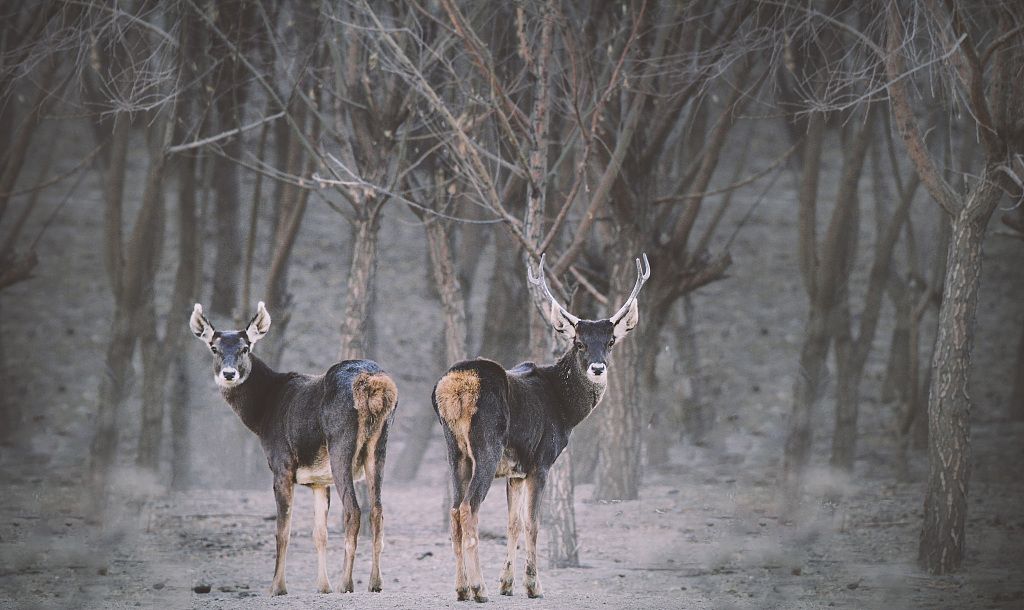
Shanghai has kicked off its first ‘wildlife conservation month’ to raise public awareness. It follows the passage of the city’s new law that focuses on establishing an asylum system for wild animals, improving wildlife habitats, and promoting community engagement on conservation projects. Shine
Voluntary cuts to Colorado River water usage by Arizona, California, and Nevada will be enough to prevent critically-low levels until 2026. Under the proposal, the three states will cut 3 million acre-feet over the next three years—about 14% of the region’s supply—in exchange for federal funding. Inside Climate News
Two decades ago, an ambitious rewilding project in Gorongosa National Park put girls’ education and female empowerment at the heart of its conservation blueprint. It was the first park in Mozambique to introduce female anti-poaching rangers and today provides internships and university programs to encourage girls to stay in education and challenge the tradition of early marriage. El País
If we want to see a generation of change, we need to focus on girls and women. If these children grow up understanding and benefiting from what the park is providing them, it’s one of our biggest ways of trying to send the message that they need to protect the environment, they need to protect the park.
Larissa Sousa, Associate Director of Communications, Gorongosa National Park
Forests across West Bengal, India, have been restored through a collective effort that started in the early 1990s with over a hundred villages. In 2017, the government scaled up the project to 450 villages, and today 6,000 acres of land have been re-greened with 66 species of commercial varieties of trees improving the livelihoods of 12,000 households. RTBC
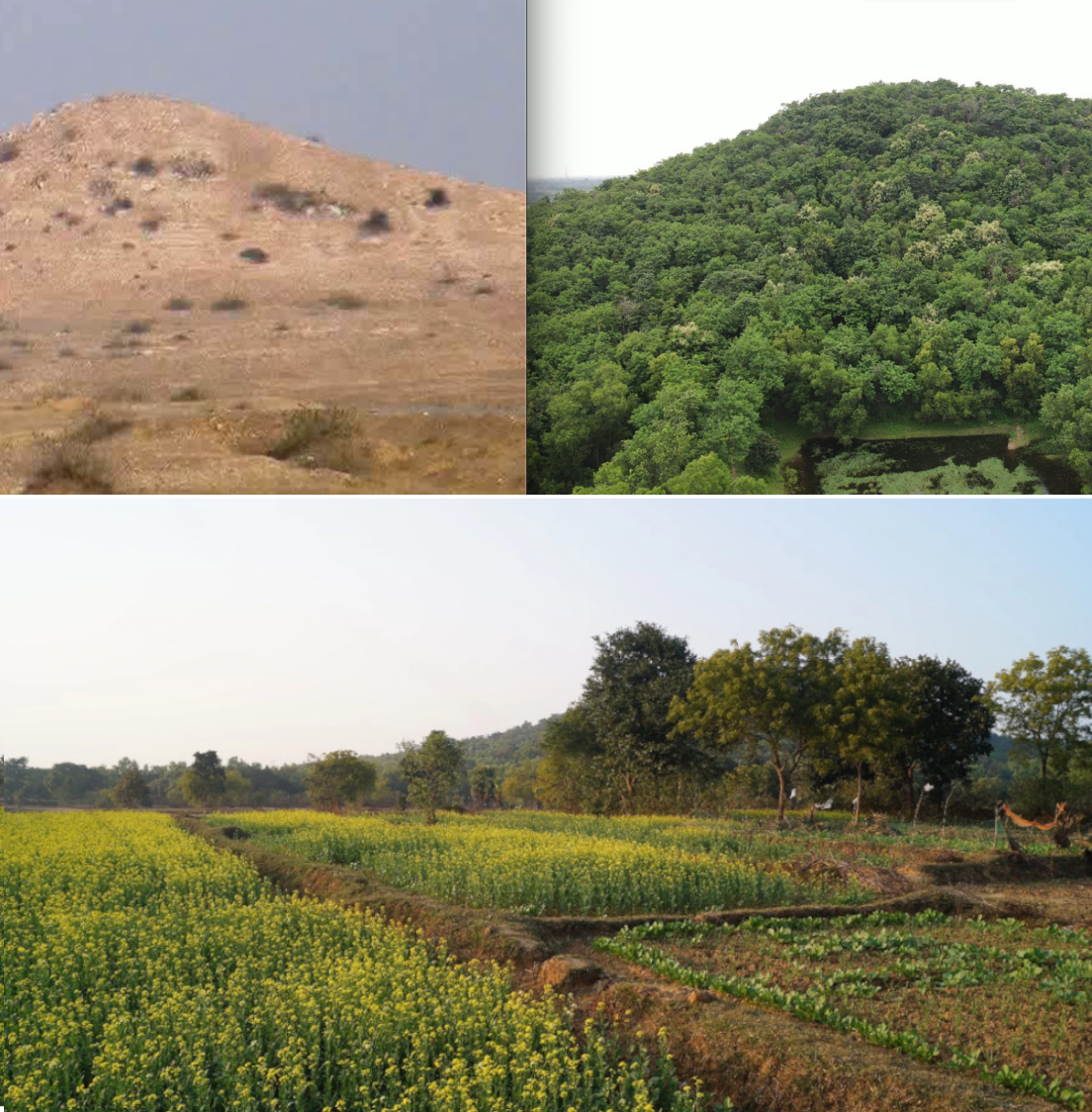
Indonesia, the world’s largest palm oil producer, will restore close to half a million acres of monoculture palm oil plantations to forest, and according to officials, the figure may increase. The country has also recognised, for the first time, 22,549 hectares of ancestral forests in Aceh, which will give communities legal protection to manage their forests in a sustainable manner.
Kenya celebrated its first national tree planting holiday on Monday, 13th November as part of a government initiative to plant 15 billion trees by 2032. The project includes an app called JazaMiti (Swahili for 'fill with trees'), which people can use to document their planting activity and find which tree species is suited to their location. Guardian
A charity will rewild an 18,500-acre sporting estate in Perthshire, Scotland, to recover habitats for iconic species such as the capercaillie; and in Cambridgeshire, England, one of the most ambitious restoration schemes in Europe will allow water to return to 9,000 acres of previously-drained fields to entice animals and birds back to the region, including voles and kingfishers.
For the first time this century, we will have a continuous corridor of natural wet fenland that will stretch over thousands of acres of the Great Fen.
Kate Carver, Manager, Great Fen Project
A petition to ban fur farming and sales across the EU has gathered over 1.5 million signatures and is now being considered by Parliament. The production of fur in the EU is already in sharp decline, with 14 member states having banned fur farming or implementing strict laws to ensure animal welfare. Euro News
And finally, we had to share this. It's a photograph titled ‘Wolves On The Hunt’ by Tobias Richter, and the winner of the Rewilding Europe Award, which celebrates photographers who capture rewilding efforts. The image depicts a family of wolves facing off against a boar family in the German countryside. Easily worth a thousand words.
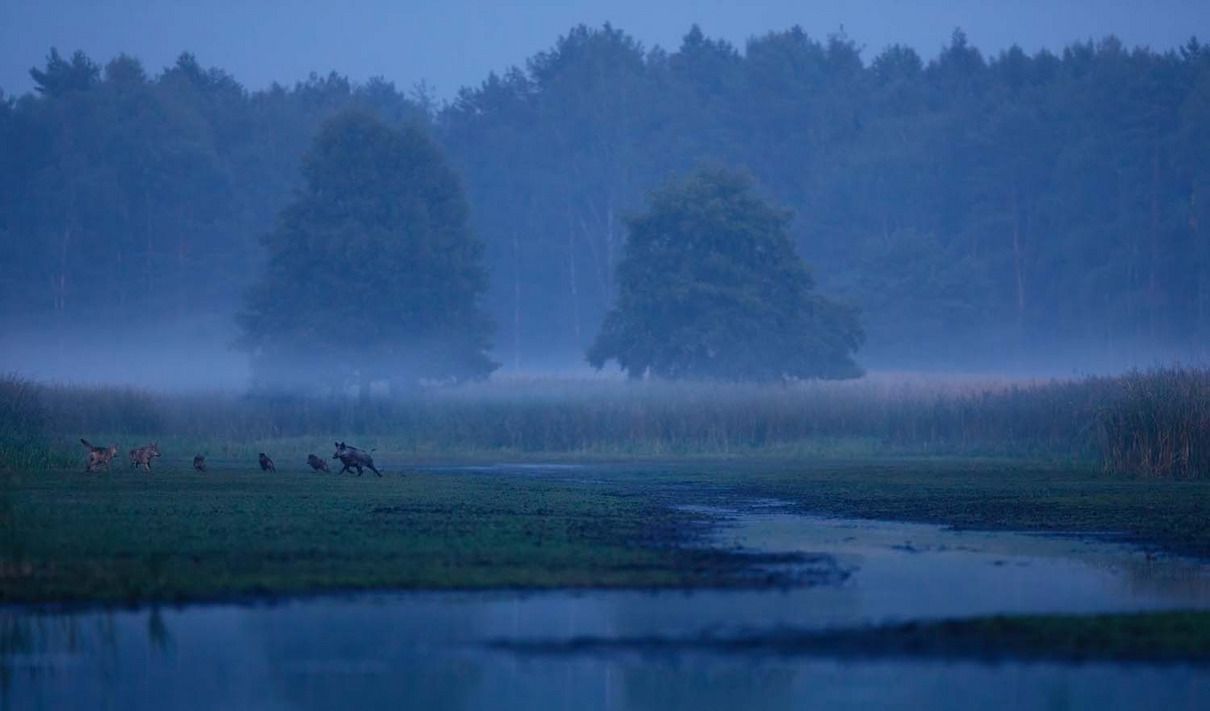
That's it for this edition, thanks for reading. Terrible things are happening, but that doesn't mean everything happening is terrible.
We'll see you next week.
With love,
Gus and Amy



